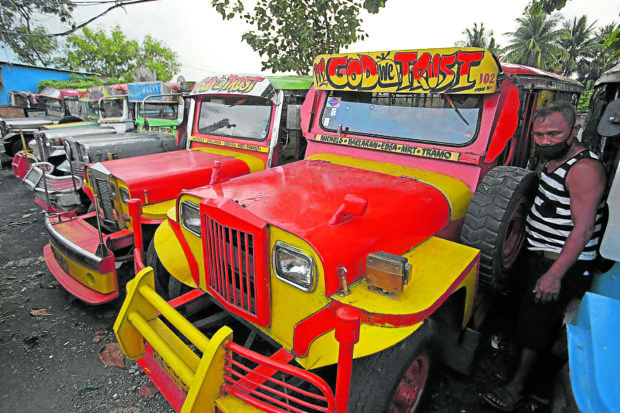
OLD RIDE The pandemic has sidelined jeepney drivers after public transport is restricted to contain the spread of COVID-19. Drivers and operators around the country are bracing for the phaseout of traditional jeepneys as the government moves to modernize public transport. (Photo by RICHARD A. REYES / Philippine Daily Inquirer)
MANILA, Philippines — Sen. Sherwin Gatchalian is pushing for additional cash subsidies to drivers of public utility vehicles (PUVs) on expectations that local pump prices of petroleum products will continue rising as the Russian invasion of Ukraine drags on, disrupting global oil supply and distribution.
The latest round of fuel price increases on Tuesday has brought pump rates upward by P100 a liter for specific fuel variants in some provincial markets, particularly in several towns of Palawan and especially in Puerto Princesa City.
On Wednesday, international credit watchdog Fitch Ratings said it had increased its oil and gas price assumptions by $5 a barrel due to trade flow disruptions and redirection coupled with higher postpandemic demand.
From the previous forecast of $100 a barrel of Brent crude oil, the de facto global benchmark, Fitch Ratings, now penciled an average of $105 a barrel for 2022.
Similarly, the company raised its forecast for 2023 to $85 a barrel from an average of $80 previously.
“Our raised oil price assumptions reflect disruptions of established supply channels and growing oil demand,” Fitch Ratings said. “The EU has banned seaborne imports from Russia, so it will have to replace about a third of all oil imports with supplies from other regions, while larger volumes of Russian oil will go to India and China.”
Based on projections made by the Bangko Sentral ng Pilipinas (BSP) as of May, prices of Dubai crude oil—the Asian benchmark—were assumed to settle at about $100.40 a barrel in 2022 and $89.50 in 2023.
These were higher by $17.10 and $13.80 a barrel, respectively, compared to previous BSP forecasts of $83.30 for 2022 and $75.70 for 2023. The BSP cited adverse spillover effects—mainly oil supply disruptions that push prices higher—from the Russia-Ukraine conflict as the reason for the upward revision.
“World oil prices continue to remain volatile with downside pressures coming mainly from lower Chinese demand and upside pressures from the protracted conflict between Russia and Ukraine,” the BSP said, hinting at possible further upward revisions.
Considering this, Gatchalian said in an interview with CNN Philippines that a third tranche of targeted subsidy for PUV drivers might be needed.
The Department of Budget and Management released in March P2.5 billion under the Department of Transportation’s 2022 budget to cover the first tranche of fuel subsidy to more than 377,000 eligible PUV drivers, who would receive P6,500 each.
Another P2.5 billion in fuel subsidy was released the following month, sourced from excess collections of the 12-percent value-added tax (VAT) on oil.
Gatchalian said the amount was reportedly good for only eight days of relief for the beneficiaries.
The lawmaker added that while he preferred targeted cash transfers, he was amenable to a suspension of the excise on imported fuel if the conflict in Ukraine would be prolonged further over the next six to 12 months.
Gatchalian, outgoing chair of the Senate committee on energy, said he would call for a hearing to discuss these matters.
Next admin’s call
However, President Duterte’s economic managers had earlier said that they were leaving it to the incoming administration of President-elect Ferdinand Marcos Jr. to decide whether it would heed the clamor for a suspension of the excise tax.
While Marcos had called on the government to suspend the fuel tax in one of his campaign sorties last March, he later backtracked and said in a press briefing streamed on his Facebook page on May 26 that there were other ways to address the rising cost of fuel.
He said they were looking at possibly supporting hard-hit areas instead of fully suspending the tax as the government needed funds for its projects.
“I think there are other ways to handle the increase and the disturbances that we are having in terms of the petroleum products that we are importing. We can support those areas (hit by rising oil prices)—number one there is transport. And this is important because transport is going to be critical in the resurgence of the economy,” he said.
Marcos stressed that if there was a study showing that removing excise on fuel would be beneficial, he might push for it—something that his economic team would be tackling in the first week of the new administration.